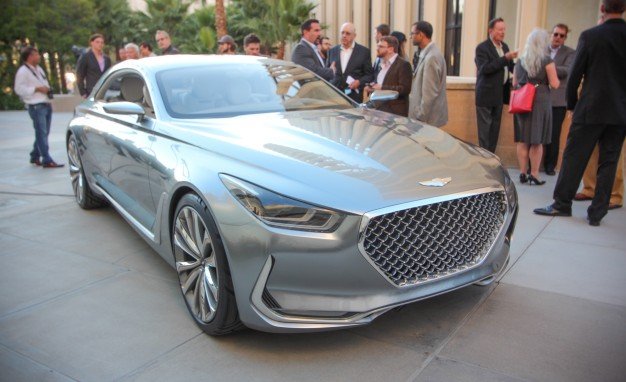Hyundai Chooses a Different Luxury Path from Japanese

After spending 15 years refining its luxury cars, Hyundai Motor Co. finally thinks it's ready for a stand-alone luxury brand, called Genesis.
But rather than opening posh, exclusive showrooms and choosing a new name to distance its luxury cars from the existing brand -- as Honda, Nissan and Toyota did when they formed Acura, Infiniti and Lexus in the late 1980s -- Hyundai is elevating a name from its existing vehicle family, with no apologies for its ties to the mass-market brand.
"Hyundai is not so keen on just following what's been done," Chris Chapman, head of Hyundai's California design studio, said in August, when Hyundai unveiled the Vision G luxury concept at the Pebble Beach Concours d'Elegance. "Hopefully, people would associate [the two brands] and they'd go 'Oh, a Genesis. That's a Hyundai. We know that.' As opposed to saying, 'Oh, a Genesis. Who makes that?'"
Genesis will launch in the 2017 model year, through existing Hyun-dai dealerships, and expand to six vehicles by 2020.
Hyundai has long dreamed of building a luxury brand to bolster its business, which in good times ranks among the most profitable in the global auto industry. But Genesis' striking products could also help polish the prestige of Hyundai.
"I would look at it ... as the icing on the cake," said Peter Schreyer, president and chief designer for Hyundai Motor Group.
Although luxury-car sales are booming, Hyundai may encounter more challenges than Honda, Nissan and Toyota did when they built out their luxury channels.
The Japanese luxury brands "got going partly because the German competition didn't take them seriously," said Ian Beavis, chief strategy officer at automotive consultancy AMCI, who worked on the 1989 launch of Lexus for ad agency Saatchi & Saatchi. "No one is going to be doubting the power and the will of the Hyundai Group to do this properly."
And even with the deep pockets and business strength behind it, Genesis doesn't have decades of heritage or name recognition to build upon.
Meanwhile, Ford, General Motors and Fiat Chrysler are spending billions to rebuild the century-old Lincoln, Cadillac and Alfa Romeo brands. Other Asian challengers have bought their way into the market, acquiring Jaguar, Land Rover and Volvo.
In such a crowded field, Genesis cannot succeed as a "me-too brand," said Beavis, a former marketing executive with Kia Motors America and Mitsubishi Motors North America. "They've got to carve out a philosophy and a brand promise that is unique."
Hyundai said last week that Genesis will eschew the "technological overload" of its rivals, focusing instead on a simple, personalized experience and attentive service.
"It's going to be about the value of time," Mike O'Brien, vice president of corporate and product planning at Hyundai Motor America, said last week. "How do we focus our products and our customer experience on valuing their time above all else?"
In some ways, though, Genesis will adhere to a time-tested strategy.
Its lineup will start with a ladder of three sedans, akin to BMW's 3 series, 5 series and 7 series. The top rungs will be occupied by what's now the Hyundai Genesis and a redesigned Equus, to be renamed the G80 and G90, respectively. The third will be a smaller sedan called the G70, followed later by a coupe, a midsize crossover and a larger SUV.
To give the lineup a distinctive look, Hyundai hired Luc Donckerwolke, the former Volkswagen Group designer known for penning the Lamborghini Murciélago and the current-generation Bentley Flying Spur. He joined Hyundai in June.
Hyundai hasn't decided yet how the U.S. sales channel for Genesis will be structured in the long term.
The car-heavy strategy may hold back Hyundai's early fortunes in the U.S. Luxury brands delivered 1.6 million vehicles in the U.S. through October of this year, with sales of crossovers (up 21 percent) and SUVs (up 16 percent) accounting for half of the sales and virtually all of the growth.
And even with six nameplates, Genesis may struggle to keep up with the likes of Audi, BMW and Mercedes-Benz, which have more than a dozen model lines apiece.
"They've got to know they're not going to have runaway success overnight," Beavis said of Hyundai. "This is going to be a long road."
Playbook of Genesis
Seven years after introducing the Genesis as a rival to German sport sedans, Hyundai is spinning off the nameplate into its own luxury brand. Here's the game plan.
- Launch: 2017 model year, starting with the Genesis G90 flagship sedan
- Models: 6 by 2020, including 3 sedans, a coupe, a midsize crossover and an SUV
- Architecture: Rear-wheel drive, with optional all-wheel drive on certain models
- Nomenclature: G70 (new model), G80 (current Genesis), G90 (redesigned Equus)
- Logo: A redesigned version of the winged emblem used on the Genesis
- Markets: South Korea, North America, China and the Middle East, initially
- Designer: Luc Donckerwolke, previously design director at Bentley
Nouvelles connexes


